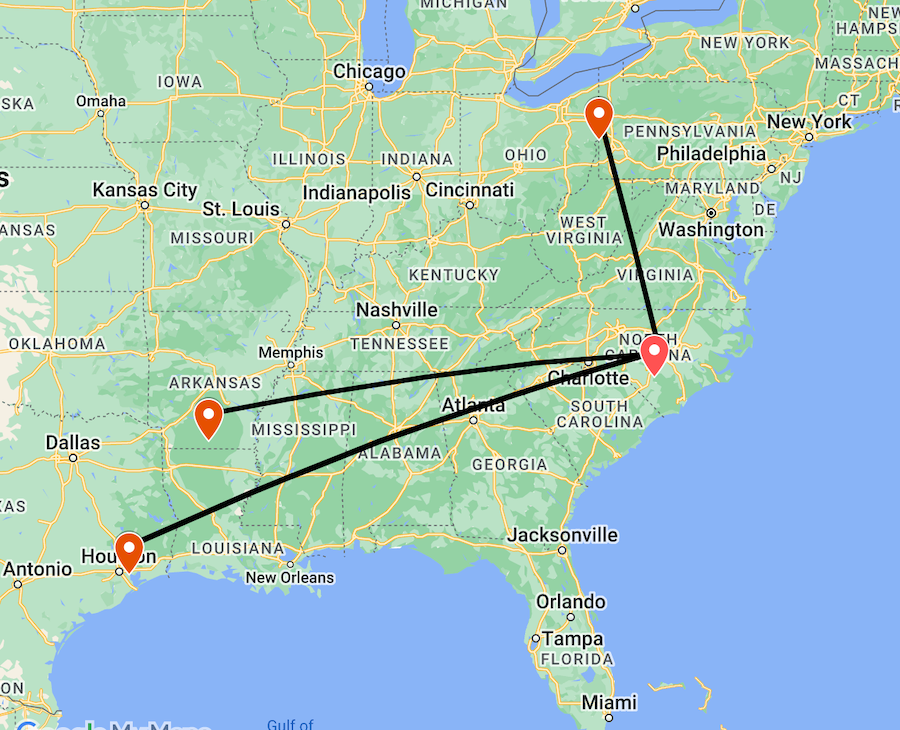EPA explains why it authorized GenX imports to Fayetteville
Oct. 30, 5:19 p.m.: This story has been updated with comments from Chemours. Newsline originally contacted the long-time spokesperson and received no response. That spokesperson retired earlier this month.
The EPA had no legal authority to block exports of GenX wastewater from the Netherlands to North Carolina, the agency said this week, because of an international law governing shipments of hazardous and non-hazardous waste.
More: Pitts: Residents still on bottled water as more ‘forever chemicals’ on way to Fayetteville Works
In an email to media outlets, the EPA provided more details about its recent decision to authorize a Chemours facility in Dordrecht, Netherlands to export 4 million pounds of GenX wastewater to the company’s Fayetteville Works plant in North Carolina over the next year.

NC Newsline reported on the new authorization last week.
The Fayetteville Works plant then reuses and recycles the imported waste, according to the EPA. Reclaiming and recycling GenX “is an important circularity activity that helps reduce the need to manufacture larger volumes of new, virgin HFPO-DA [GenX],” a company spokesperson said via email. “Chemours works closely with EPA and other authorities who regularly review and approve the permits required to perform this activity.”
More: Chemours advances with Fayetteville site expansion; residents skeptical
Chemours: GenX imports likely ‘far lower’ than authorized
Chemours anticipates that the actual volumes received for recycling “will be far lower,” the spokesperson added. “Chemours’s Fayetteville Works has emissions control technologies in place to abate emissions of fluorinated compounds in accordance with our operating permits and levels contained in the Consent Order agreement with NC DEQ and Cape Fear River Watch.”
More: Chemours must take more action to address GenX, PFAS contamination, state DEQ officials say
GenX is one type of 15,000 PFAS — short for per-and polyfluoroalkyl substances — that have been proven to harm human health, including testicular, kidney, liver and pancreatic cancers, low birth weight, reproductive disorders, depressed immune responses and high cholesterol. They are widespread in the environment, where they don’t degrade, earning them the nickname “forever chemicals.”
The Basel Convention, which was ratified in 1992, governs the control of international movements and disposal of hazardous and non-hazardous waste. However, GenX and other types of PFAS are not regulated as hazardous waste in the U.S., which constrains the EPA from rejecting imports as long as the exporter has fully completed the required paperwork.
In late 2018 the EPA did just that. It rejected Chemours’s export/import proposal for GenX, Newsline previously reported, because of insufficient information, including outdated sampling data.
Chemours then submitted additional information in October 2022 “that was insufficient to support the review and approval,” the EPA spokesman said.
This summer, Chemours provided confidential business information that addressed the previous information gaps. “Absent other disqualifying circumstances, it left EPA with no course of action other than to provide the conditional consent,” the agency spokesman said.
State regulators not informed
Tim Whitehouse is the executive director of Public Employees for Environmental Responsibility. He worked as senior attorney at the EPA for 10 years, including in the division responsible for approving waste imports and exports.
Whitehouse said the recent approval of the Chemours shipments “were probably made at a very high level.”
Sharon Martin, deputy press secretary for the N.C. Department of Environmental Quality, previously told Newsline that the EPA had not informed state regulators of the imports.
Although the EPA was not required to inform DEQ, the lack of notification is notable. EPA Administrator Michael Regan oversaw the GenX crisis when he served as DEQ Secretary, along with his chief deputy, John Nicholson. Nicholson is now chief of staff at EPA Region 4.
“If North Carolina wasn’t notified, it was a huge political blunder,” Whitehouse said. “There’s no excuse not to notify a state about the import of this type of waste.”
In reviewing the latest consent request from the Netherlands, the EPA “looked at the Fayetteville Works facility’s operational capacity and status,” the agency spokesman said.
How to dispose of waste?
The building at the Chemours Fayetteville Works facility where GenX is recovered from imported wastewater is subject to federal and state consent orders over water discharges and air emissions. Neither consent order prohibits the importation of waste containing GenX for recovery at this facility.
All recycling residuals from the GenX recovery process at the Chemours Fayetteville Works facility – though not classified as hazardous waste – are sent to the Clean Harbors hazardous waste disposal facility in Deer Park, Texas, according to the EPA.
Clean Harbors is one of the largest hazardous waste disposal companies in the U.S., with plants in multiple states. The company and its subsidiaries have accrued dozens of air quality and waste handling violations, resulting in millions of dollars in civil penalties.

Two EPA websites, the PFAS tracker and e-Manifest, show that the Fayetteville Works plant has shipped at least 37.5 tons of GenX and PFAS compounds to Deer Park and other hazardous waste facilities in the U.S. since 2018.
These facilities include Clean Harbors plant in El Dorado, Ark., and Heritage Thermal Services in East Liverpool, Ohio, which incinerate the material. The Deer Park facility also injects it into deep wells, according to e-Manifest.
All three of these towns and cities either have large non-white populations, are low-income, or both, according to census data.
In El Dorado, 47% of residents are Black, and more than 22% live at or below the poverty line.
East Liverpool is a predominantly white town, with 29% of people living at or below the poverty line.
More than 37% of Deer Park residents are Latino.
EPA could designate 2 types of PFAS as hazardous
The EPA is developing two proposed rules to designate some types of PFAS as hazardous. If that occurs, those compounds would then be more tightly regulated under a federal waste law, known as RCRA – the Resource Conservation and Recovery Act.
Under RCRA, several types of PFAS, including GenX, would be subject to stricter production, disposal and cleanup – known as “cradle to grave” requirements.
The federal Office of Management and Budget is reviewing the proposed rules, which will be published for public comment once they are released. “This is a necessary building block for future work to regulate PFAS as a listed hazardous waste,” the EPA spokesperson said.
The OMB was scheduled to publish the proposed rules in August, but is nearly three months late in doing so.
European countries are ahead of the U.S. in regulating GenX and other types of PFAS. As those restrictions tighten, it is likely that companies will export more of the compounds to the U.S., which has lax regulations. In turn, companies such as Chemours and 3M, will ship their waste across the country for disposal.
“The shipment of PFAS waste in the U.S. is a serious health problem,” Whitehouse said. “And it will grow over time as Europe regulates PFAS.”
The Netherlands, for example, classifies PFAS and GenX as hazardous.
In the Journal of Air Law and Commerce, Maggie Clark, a judicial clerk to Chief Justice Michael Kruse of American Samoa, argued that given the Netherlands’s determination the compounds are hazardous, “they should be treated as such on the international stage when trading” with that country.
“If GenX and its parent compound are allowed to be transported unchecked,” Clark wrote, “the international community risks losing everything the Basel Convention and other international agreements have worked towards to create a pollution-free environment.”
This story originally published in NC Newsline, a nonpartisan nonprofit news organization dedicated to fearless reporting and hard-hitting commentary that shines a light on injustice, holds public officials accountable, and helps improve the quality of life for all North Carolinians. It is republished under a Creative Commons license.
This article originally appeared on The Fayetteville Observer: Fayetteville Chemours plant to get more imported GenX. EPA explains

